Exploring Legal and Ethical Frameworks in Healthcare Narratives
VerifiedAdded on 2023/06/18
|9
|1921
|369
Report
AI Summary
This report delves into the intersection of ethics and law within healthcare, examining three distinct narratives. The first narrative addresses the ethical considerations surrounding donor anonymity and the potential breaches of privacy when direct contact occurs between donor families and recipients, highlighting the legal ramifications under the Human Tissue Act. The second narrative explores the complexities of obtaining informed consent from young individuals, referencing common law and the Gillick v. Wisbech Area Health Authority case to discuss the balance between patient autonomy and parental involvement. Finally, the third narrative scrutinizes the ethical principles of autonomy, beneficence, non-maleficence, and justice in the context of an elderly patient's refusal of care, referencing the Mental Health Act and the responsibilities of healthcare facilities. The report concludes by emphasizing the crucial role of ethics and laws in guiding healthcare practices and ensuring patient welfare.
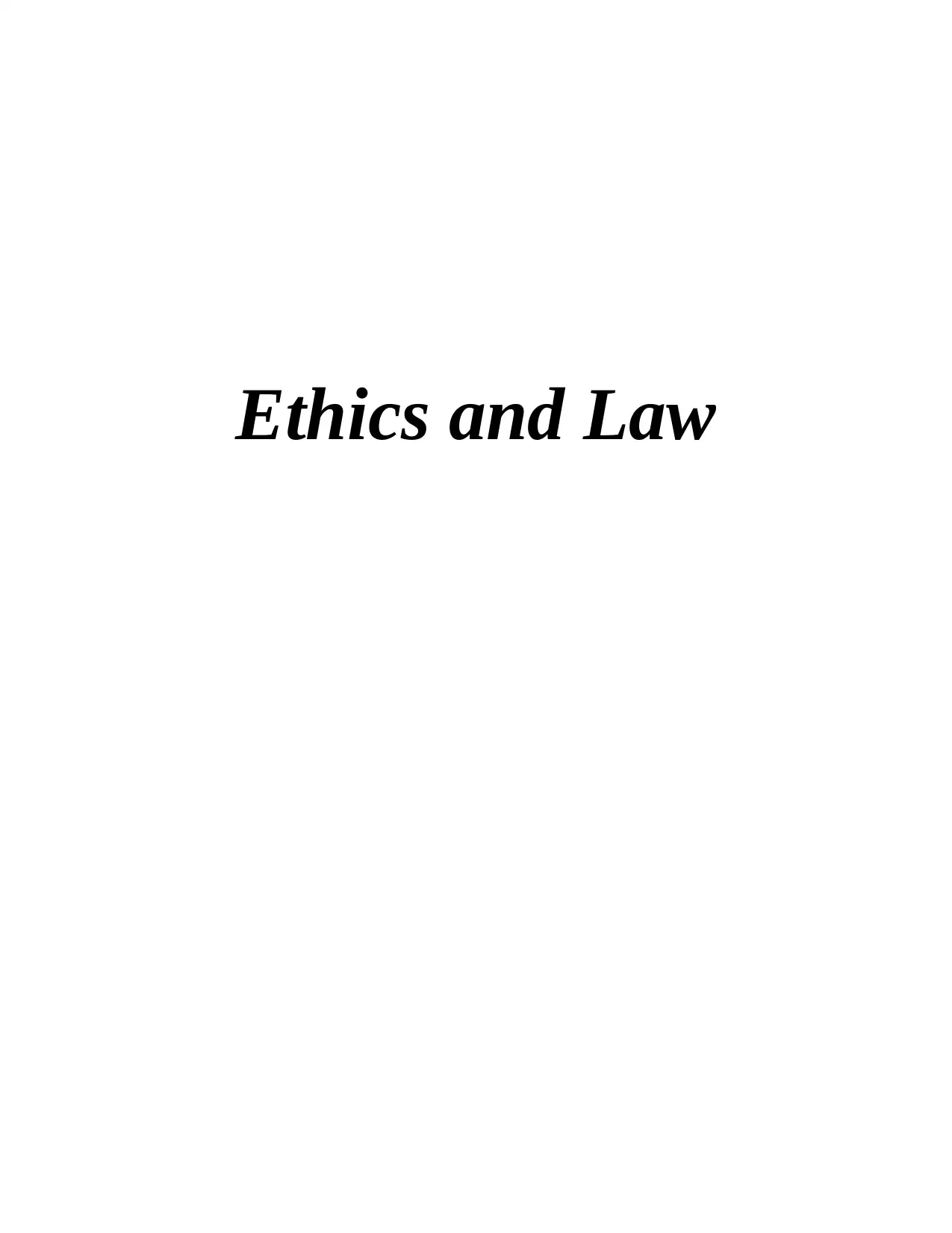
Ethics and Law
Paraphrase This Document
Need a fresh take? Get an instant paraphrase of this document with our AI Paraphraser
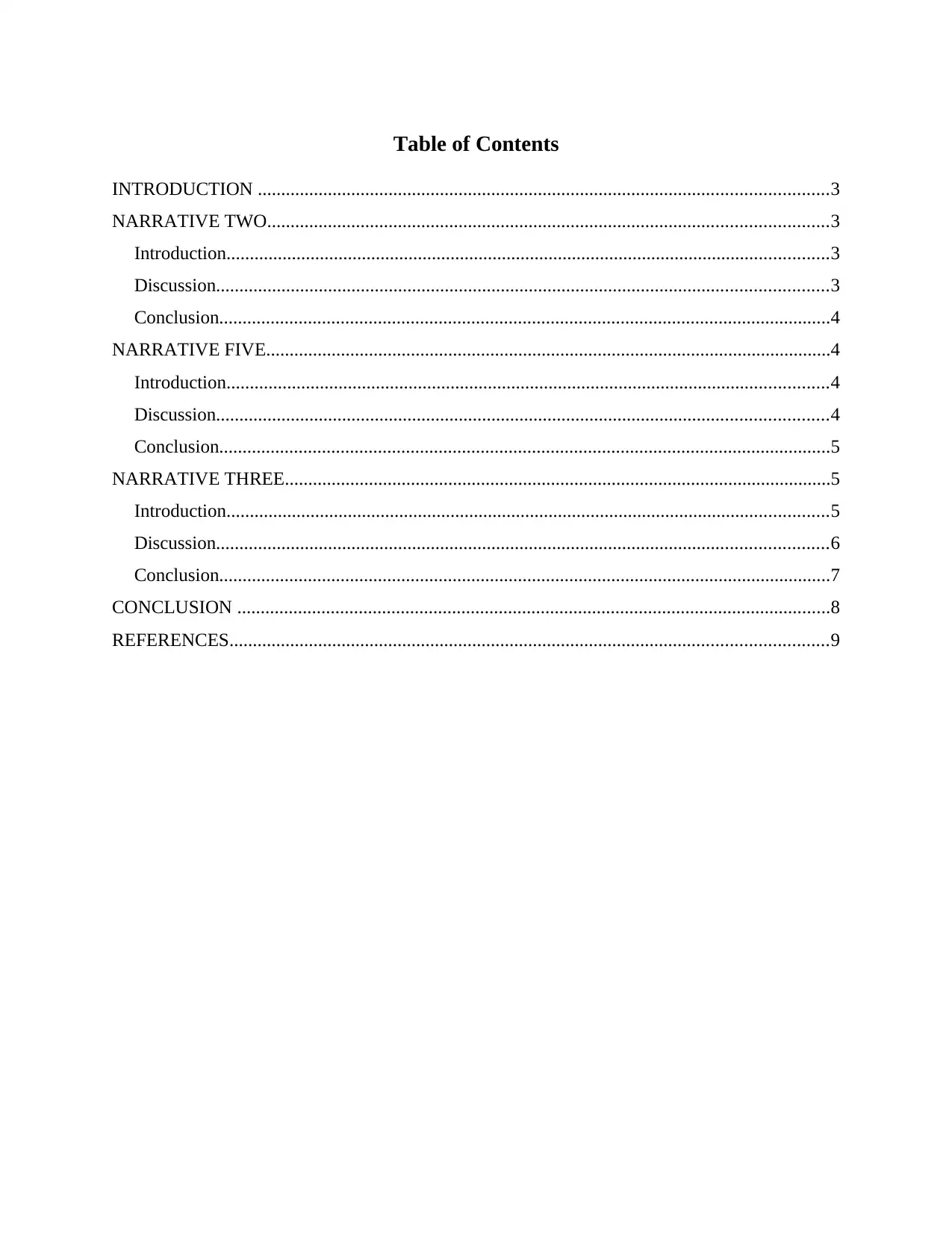
Table of Contents
INTRODUCTION ..........................................................................................................................3
NARRATIVE TWO........................................................................................................................3
Introduction.................................................................................................................................3
Discussion...................................................................................................................................3
Conclusion...................................................................................................................................4
NARRATIVE FIVE.........................................................................................................................4
Introduction.................................................................................................................................4
Discussion...................................................................................................................................4
Conclusion...................................................................................................................................5
NARRATIVE THREE.....................................................................................................................5
Introduction.................................................................................................................................5
Discussion...................................................................................................................................6
Conclusion...................................................................................................................................7
CONCLUSION ...............................................................................................................................8
REFERENCES................................................................................................................................9
INTRODUCTION ..........................................................................................................................3
NARRATIVE TWO........................................................................................................................3
Introduction.................................................................................................................................3
Discussion...................................................................................................................................3
Conclusion...................................................................................................................................4
NARRATIVE FIVE.........................................................................................................................4
Introduction.................................................................................................................................4
Discussion...................................................................................................................................4
Conclusion...................................................................................................................................5
NARRATIVE THREE.....................................................................................................................5
Introduction.................................................................................................................................5
Discussion...................................................................................................................................6
Conclusion...................................................................................................................................7
CONCLUSION ...............................................................................................................................8
REFERENCES................................................................................................................................9
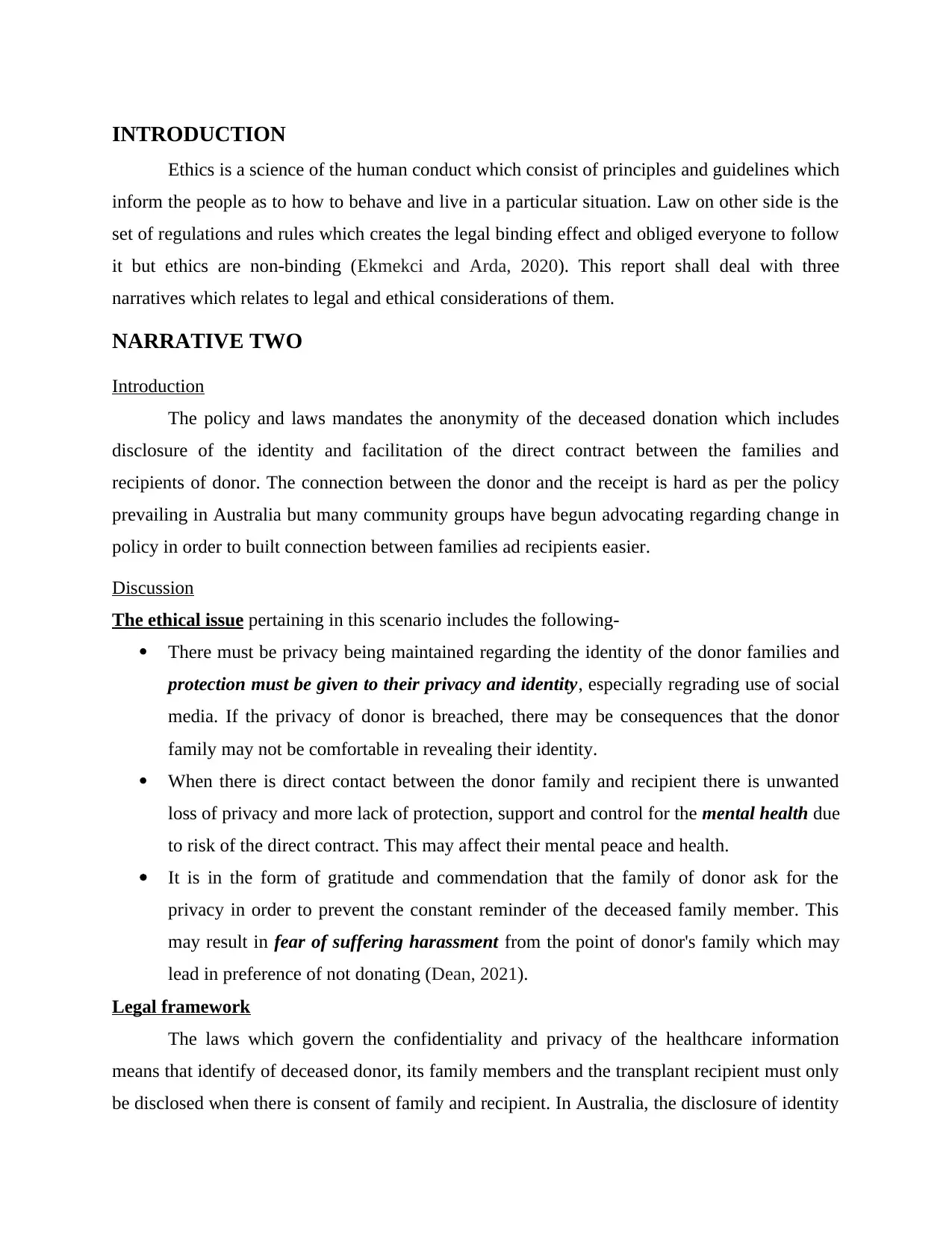
INTRODUCTION
Ethics is a science of the human conduct which consist of principles and guidelines which
inform the people as to how to behave and live in a particular situation. Law on other side is the
set of regulations and rules which creates the legal binding effect and obliged everyone to follow
it but ethics are non-binding (Ekmekci and Arda, 2020). This report shall deal with three
narratives which relates to legal and ethical considerations of them.
NARRATIVE TWO
Introduction
The policy and laws mandates the anonymity of the deceased donation which includes
disclosure of the identity and facilitation of the direct contract between the families and
recipients of donor. The connection between the donor and the receipt is hard as per the policy
prevailing in Australia but many community groups have begun advocating regarding change in
policy in order to built connection between families ad recipients easier.
Discussion
The ethical issue pertaining in this scenario includes the following-
There must be privacy being maintained regarding the identity of the donor families and
protection must be given to their privacy and identity, especially regrading use of social
media. If the privacy of donor is breached, there may be consequences that the donor
family may not be comfortable in revealing their identity.
When there is direct contact between the donor family and recipient there is unwanted
loss of privacy and more lack of protection, support and control for the mental health due
to risk of the direct contract. This may affect their mental peace and health.
It is in the form of gratitude and commendation that the family of donor ask for the
privacy in order to prevent the constant reminder of the deceased family member. This
may result in fear of suffering harassment from the point of donor's family which may
lead in preference of not donating (Dean, 2021).
Legal framework
The laws which govern the confidentiality and privacy of the healthcare information
means that identify of deceased donor, its family members and the transplant recipient must only
be disclosed when there is consent of family and recipient. In Australia, the disclosure of identity
Ethics is a science of the human conduct which consist of principles and guidelines which
inform the people as to how to behave and live in a particular situation. Law on other side is the
set of regulations and rules which creates the legal binding effect and obliged everyone to follow
it but ethics are non-binding (Ekmekci and Arda, 2020). This report shall deal with three
narratives which relates to legal and ethical considerations of them.
NARRATIVE TWO
Introduction
The policy and laws mandates the anonymity of the deceased donation which includes
disclosure of the identity and facilitation of the direct contract between the families and
recipients of donor. The connection between the donor and the receipt is hard as per the policy
prevailing in Australia but many community groups have begun advocating regarding change in
policy in order to built connection between families ad recipients easier.
Discussion
The ethical issue pertaining in this scenario includes the following-
There must be privacy being maintained regarding the identity of the donor families and
protection must be given to their privacy and identity, especially regrading use of social
media. If the privacy of donor is breached, there may be consequences that the donor
family may not be comfortable in revealing their identity.
When there is direct contact between the donor family and recipient there is unwanted
loss of privacy and more lack of protection, support and control for the mental health due
to risk of the direct contract. This may affect their mental peace and health.
It is in the form of gratitude and commendation that the family of donor ask for the
privacy in order to prevent the constant reminder of the deceased family member. This
may result in fear of suffering harassment from the point of donor's family which may
lead in preference of not donating (Dean, 2021).
Legal framework
The laws which govern the confidentiality and privacy of the healthcare information
means that identify of deceased donor, its family members and the transplant recipient must only
be disclosed when there is consent of family and recipient. In Australia, the disclosure of identity
⊘ This is a preview!⊘
Do you want full access?
Subscribe today to unlock all pages.

Trusted by 1+ million students worldwide
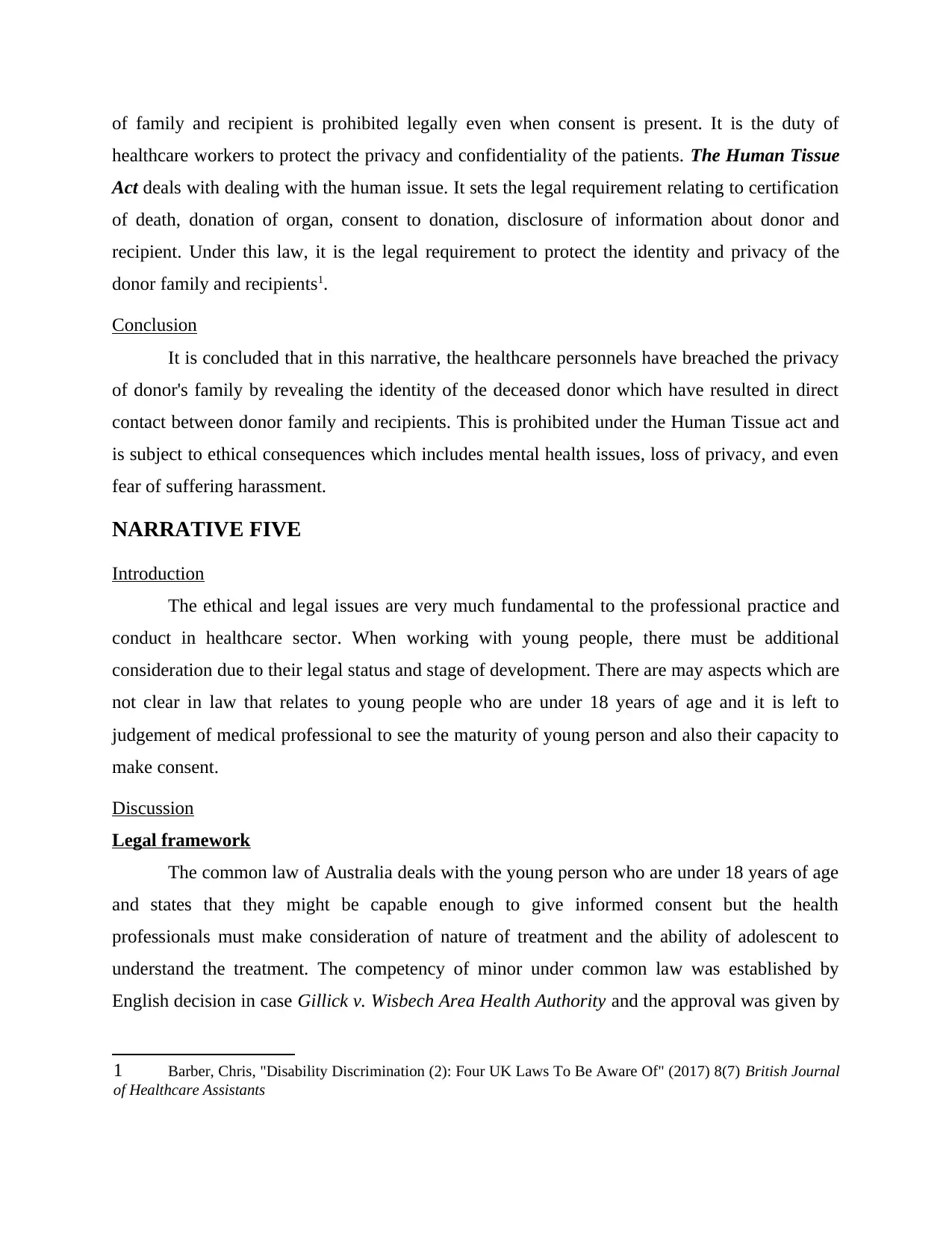
of family and recipient is prohibited legally even when consent is present. It is the duty of
healthcare workers to protect the privacy and confidentiality of the patients. The Human Tissue
Act deals with dealing with the human issue. It sets the legal requirement relating to certification
of death, donation of organ, consent to donation, disclosure of information about donor and
recipient. Under this law, it is the legal requirement to protect the identity and privacy of the
donor family and recipients1.
Conclusion
It is concluded that in this narrative, the healthcare personnels have breached the privacy
of donor's family by revealing the identity of the deceased donor which have resulted in direct
contact between donor family and recipients. This is prohibited under the Human Tissue act and
is subject to ethical consequences which includes mental health issues, loss of privacy, and even
fear of suffering harassment.
NARRATIVE FIVE
Introduction
The ethical and legal issues are very much fundamental to the professional practice and
conduct in healthcare sector. When working with young people, there must be additional
consideration due to their legal status and stage of development. There are may aspects which are
not clear in law that relates to young people who are under 18 years of age and it is left to
judgement of medical professional to see the maturity of young person and also their capacity to
make consent.
Discussion
Legal framework
The common law of Australia deals with the young person who are under 18 years of age
and states that they might be capable enough to give informed consent but the health
professionals must make consideration of nature of treatment and the ability of adolescent to
understand the treatment. The competency of minor under common law was established by
English decision in case Gillick v. Wisbech Area Health Authority and the approval was given by
1 Barber, Chris, "Disability Discrimination (2): Four UK Laws To Be Aware Of" (2017) 8(7) British Journal
of Healthcare Assistants
healthcare workers to protect the privacy and confidentiality of the patients. The Human Tissue
Act deals with dealing with the human issue. It sets the legal requirement relating to certification
of death, donation of organ, consent to donation, disclosure of information about donor and
recipient. Under this law, it is the legal requirement to protect the identity and privacy of the
donor family and recipients1.
Conclusion
It is concluded that in this narrative, the healthcare personnels have breached the privacy
of donor's family by revealing the identity of the deceased donor which have resulted in direct
contact between donor family and recipients. This is prohibited under the Human Tissue act and
is subject to ethical consequences which includes mental health issues, loss of privacy, and even
fear of suffering harassment.
NARRATIVE FIVE
Introduction
The ethical and legal issues are very much fundamental to the professional practice and
conduct in healthcare sector. When working with young people, there must be additional
consideration due to their legal status and stage of development. There are may aspects which are
not clear in law that relates to young people who are under 18 years of age and it is left to
judgement of medical professional to see the maturity of young person and also their capacity to
make consent.
Discussion
Legal framework
The common law of Australia deals with the young person who are under 18 years of age
and states that they might be capable enough to give informed consent but the health
professionals must make consideration of nature of treatment and the ability of adolescent to
understand the treatment. The competency of minor under common law was established by
English decision in case Gillick v. Wisbech Area Health Authority and the approval was given by
1 Barber, Chris, "Disability Discrimination (2): Four UK Laws To Be Aware Of" (2017) 8(7) British Journal
of Healthcare Assistants
Paraphrase This Document
Need a fresh take? Get an instant paraphrase of this document with our AI Paraphraser
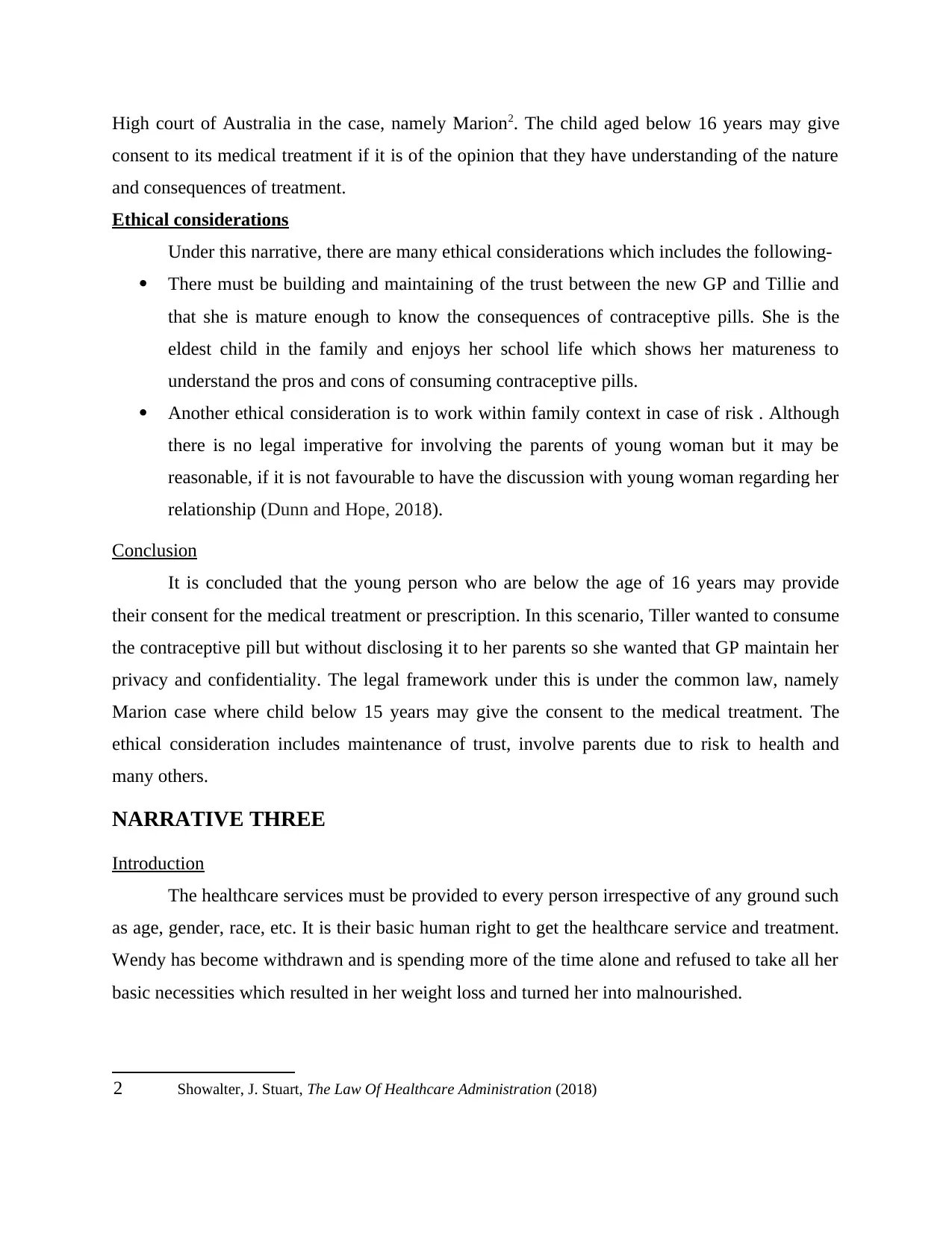
High court of Australia in the case, namely Marion2. The child aged below 16 years may give
consent to its medical treatment if it is of the opinion that they have understanding of the nature
and consequences of treatment.
Ethical considerations
Under this narrative, there are many ethical considerations which includes the following-
There must be building and maintaining of the trust between the new GP and Tillie and
that she is mature enough to know the consequences of contraceptive pills. She is the
eldest child in the family and enjoys her school life which shows her matureness to
understand the pros and cons of consuming contraceptive pills.
Another ethical consideration is to work within family context in case of risk . Although
there is no legal imperative for involving the parents of young woman but it may be
reasonable, if it is not favourable to have the discussion with young woman regarding her
relationship (Dunn and Hope, 2018).
Conclusion
It is concluded that the young person who are below the age of 16 years may provide
their consent for the medical treatment or prescription. In this scenario, Tiller wanted to consume
the contraceptive pill but without disclosing it to her parents so she wanted that GP maintain her
privacy and confidentiality. The legal framework under this is under the common law, namely
Marion case where child below 15 years may give the consent to the medical treatment. The
ethical consideration includes maintenance of trust, involve parents due to risk to health and
many others.
NARRATIVE THREE
Introduction
The healthcare services must be provided to every person irrespective of any ground such
as age, gender, race, etc. It is their basic human right to get the healthcare service and treatment.
Wendy has become withdrawn and is spending more of the time alone and refused to take all her
basic necessities which resulted in her weight loss and turned her into malnourished.
2 Showalter, J. Stuart, The Law Of Healthcare Administration (2018)
consent to its medical treatment if it is of the opinion that they have understanding of the nature
and consequences of treatment.
Ethical considerations
Under this narrative, there are many ethical considerations which includes the following-
There must be building and maintaining of the trust between the new GP and Tillie and
that she is mature enough to know the consequences of contraceptive pills. She is the
eldest child in the family and enjoys her school life which shows her matureness to
understand the pros and cons of consuming contraceptive pills.
Another ethical consideration is to work within family context in case of risk . Although
there is no legal imperative for involving the parents of young woman but it may be
reasonable, if it is not favourable to have the discussion with young woman regarding her
relationship (Dunn and Hope, 2018).
Conclusion
It is concluded that the young person who are below the age of 16 years may provide
their consent for the medical treatment or prescription. In this scenario, Tiller wanted to consume
the contraceptive pill but without disclosing it to her parents so she wanted that GP maintain her
privacy and confidentiality. The legal framework under this is under the common law, namely
Marion case where child below 15 years may give the consent to the medical treatment. The
ethical consideration includes maintenance of trust, involve parents due to risk to health and
many others.
NARRATIVE THREE
Introduction
The healthcare services must be provided to every person irrespective of any ground such
as age, gender, race, etc. It is their basic human right to get the healthcare service and treatment.
Wendy has become withdrawn and is spending more of the time alone and refused to take all her
basic necessities which resulted in her weight loss and turned her into malnourished.
2 Showalter, J. Stuart, The Law Of Healthcare Administration (2018)
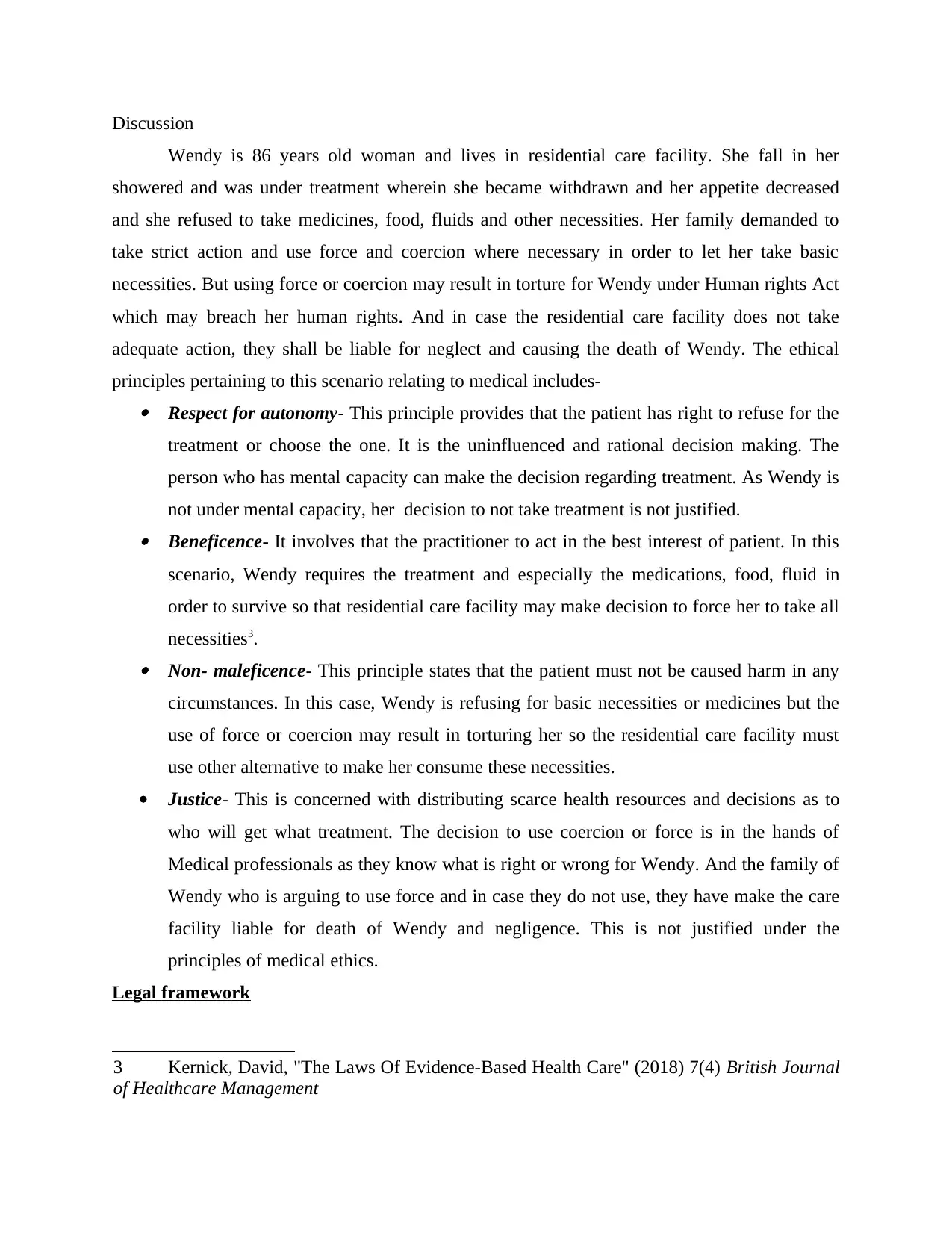
Discussion
Wendy is 86 years old woman and lives in residential care facility. She fall in her
showered and was under treatment wherein she became withdrawn and her appetite decreased
and she refused to take medicines, food, fluids and other necessities. Her family demanded to
take strict action and use force and coercion where necessary in order to let her take basic
necessities. But using force or coercion may result in torture for Wendy under Human rights Act
which may breach her human rights. And in case the residential care facility does not take
adequate action, they shall be liable for neglect and causing the death of Wendy. The ethical
principles pertaining to this scenario relating to medical includes- Respect for autonomy- This principle provides that the patient has right to refuse for the
treatment or choose the one. It is the uninfluenced and rational decision making. The
person who has mental capacity can make the decision regarding treatment. As Wendy is
not under mental capacity, her decision to not take treatment is not justified. Beneficence- It involves that the practitioner to act in the best interest of patient. In this
scenario, Wendy requires the treatment and especially the medications, food, fluid in
order to survive so that residential care facility may make decision to force her to take all
necessities3. Non- maleficence- This principle states that the patient must not be caused harm in any
circumstances. In this case, Wendy is refusing for basic necessities or medicines but the
use of force or coercion may result in torturing her so the residential care facility must
use other alternative to make her consume these necessities.
Justice- This is concerned with distributing scarce health resources and decisions as to
who will get what treatment. The decision to use coercion or force is in the hands of
Medical professionals as they know what is right or wrong for Wendy. And the family of
Wendy who is arguing to use force and in case they do not use, they have make the care
facility liable for death of Wendy and negligence. This is not justified under the
principles of medical ethics.
Legal framework
3 Kernick, David, "The Laws Of Evidence-Based Health Care" (2018) 7(4) British Journal
of Healthcare Management
Wendy is 86 years old woman and lives in residential care facility. She fall in her
showered and was under treatment wherein she became withdrawn and her appetite decreased
and she refused to take medicines, food, fluids and other necessities. Her family demanded to
take strict action and use force and coercion where necessary in order to let her take basic
necessities. But using force or coercion may result in torture for Wendy under Human rights Act
which may breach her human rights. And in case the residential care facility does not take
adequate action, they shall be liable for neglect and causing the death of Wendy. The ethical
principles pertaining to this scenario relating to medical includes- Respect for autonomy- This principle provides that the patient has right to refuse for the
treatment or choose the one. It is the uninfluenced and rational decision making. The
person who has mental capacity can make the decision regarding treatment. As Wendy is
not under mental capacity, her decision to not take treatment is not justified. Beneficence- It involves that the practitioner to act in the best interest of patient. In this
scenario, Wendy requires the treatment and especially the medications, food, fluid in
order to survive so that residential care facility may make decision to force her to take all
necessities3. Non- maleficence- This principle states that the patient must not be caused harm in any
circumstances. In this case, Wendy is refusing for basic necessities or medicines but the
use of force or coercion may result in torturing her so the residential care facility must
use other alternative to make her consume these necessities.
Justice- This is concerned with distributing scarce health resources and decisions as to
who will get what treatment. The decision to use coercion or force is in the hands of
Medical professionals as they know what is right or wrong for Wendy. And the family of
Wendy who is arguing to use force and in case they do not use, they have make the care
facility liable for death of Wendy and negligence. This is not justified under the
principles of medical ethics.
Legal framework
3 Kernick, David, "The Laws Of Evidence-Based Health Care" (2018) 7(4) British Journal
of Healthcare Management
⊘ This is a preview!⊘
Do you want full access?
Subscribe today to unlock all pages.

Trusted by 1+ million students worldwide
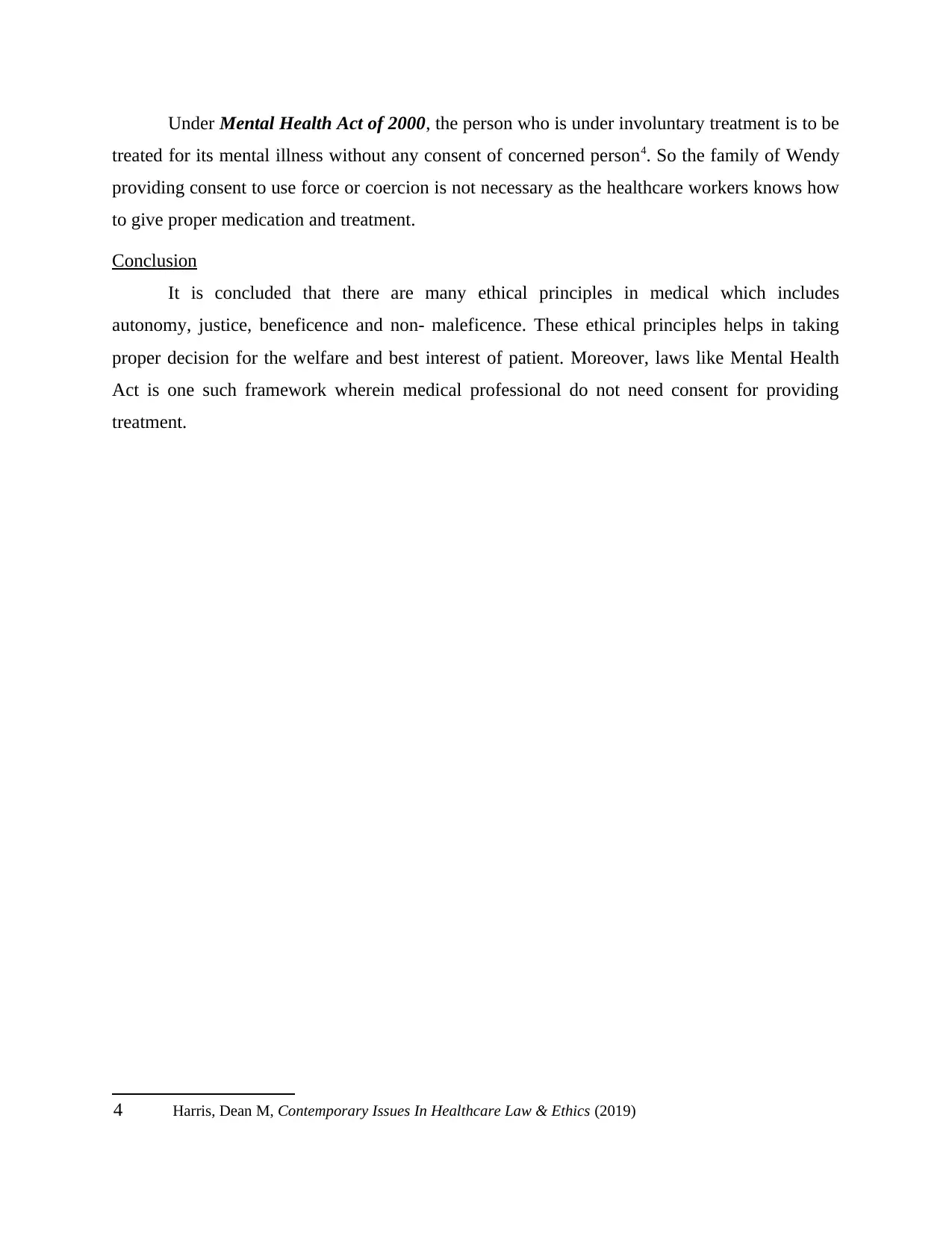
Under Mental Health Act of 2000, the person who is under involuntary treatment is to be
treated for its mental illness without any consent of concerned person4. So the family of Wendy
providing consent to use force or coercion is not necessary as the healthcare workers knows how
to give proper medication and treatment.
Conclusion
It is concluded that there are many ethical principles in medical which includes
autonomy, justice, beneficence and non- maleficence. These ethical principles helps in taking
proper decision for the welfare and best interest of patient. Moreover, laws like Mental Health
Act is one such framework wherein medical professional do not need consent for providing
treatment.
4 Harris, Dean M, Contemporary Issues In Healthcare Law & Ethics (2019)
treated for its mental illness without any consent of concerned person4. So the family of Wendy
providing consent to use force or coercion is not necessary as the healthcare workers knows how
to give proper medication and treatment.
Conclusion
It is concluded that there are many ethical principles in medical which includes
autonomy, justice, beneficence and non- maleficence. These ethical principles helps in taking
proper decision for the welfare and best interest of patient. Moreover, laws like Mental Health
Act is one such framework wherein medical professional do not need consent for providing
treatment.
4 Harris, Dean M, Contemporary Issues In Healthcare Law & Ethics (2019)
Paraphrase This Document
Need a fresh take? Get an instant paraphrase of this document with our AI Paraphraser
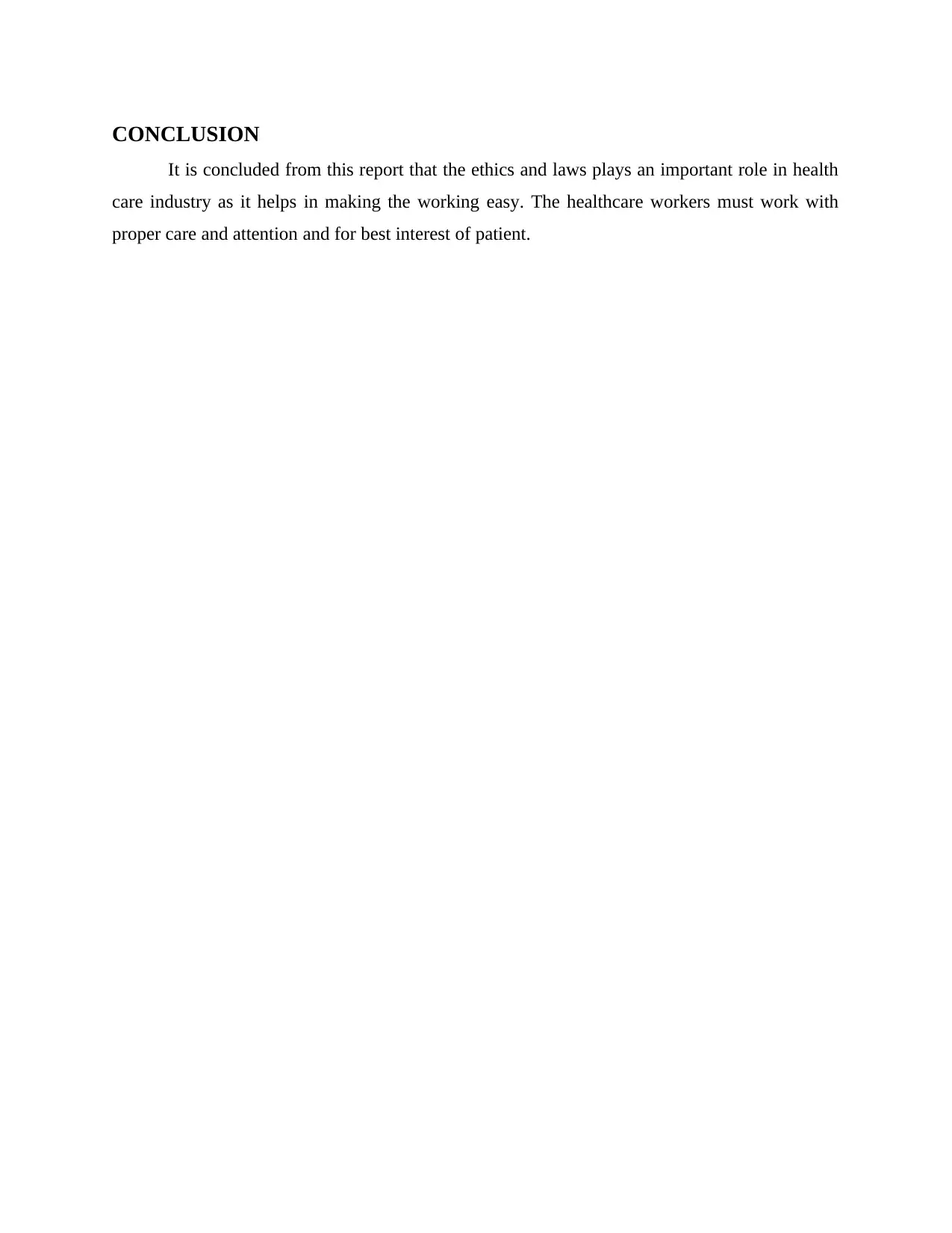
CONCLUSION
It is concluded from this report that the ethics and laws plays an important role in health
care industry as it helps in making the working easy. The healthcare workers must work with
proper care and attention and for best interest of patient.
It is concluded from this report that the ethics and laws plays an important role in health
care industry as it helps in making the working easy. The healthcare workers must work with
proper care and attention and for best interest of patient.
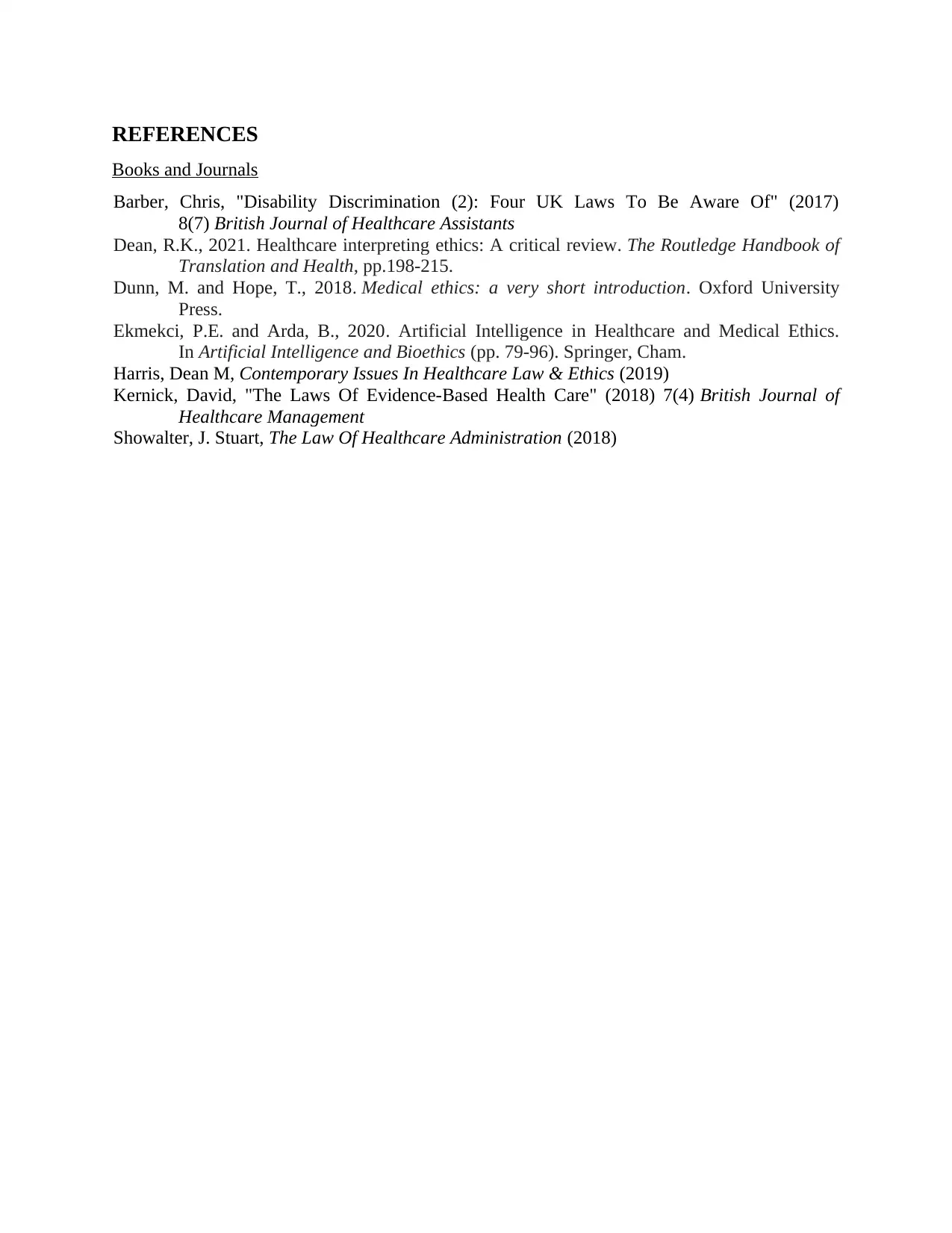
REFERENCES
Books and Journals
Barber, Chris, "Disability Discrimination (2): Four UK Laws To Be Aware Of" (2017)
8(7) British Journal of Healthcare Assistants
Dean, R.K., 2021. Healthcare interpreting ethics: A critical review. The Routledge Handbook of
Translation and Health, pp.198-215.
Dunn, M. and Hope, T., 2018. Medical ethics: a very short introduction. Oxford University
Press.
Ekmekci, P.E. and Arda, B., 2020. Artificial Intelligence in Healthcare and Medical Ethics.
In Artificial Intelligence and Bioethics (pp. 79-96). Springer, Cham.
Harris, Dean M, Contemporary Issues In Healthcare Law & Ethics (2019)
Kernick, David, "The Laws Of Evidence-Based Health Care" (2018) 7(4) British Journal of
Healthcare Management
Showalter, J. Stuart, The Law Of Healthcare Administration (2018)
Books and Journals
Barber, Chris, "Disability Discrimination (2): Four UK Laws To Be Aware Of" (2017)
8(7) British Journal of Healthcare Assistants
Dean, R.K., 2021. Healthcare interpreting ethics: A critical review. The Routledge Handbook of
Translation and Health, pp.198-215.
Dunn, M. and Hope, T., 2018. Medical ethics: a very short introduction. Oxford University
Press.
Ekmekci, P.E. and Arda, B., 2020. Artificial Intelligence in Healthcare and Medical Ethics.
In Artificial Intelligence and Bioethics (pp. 79-96). Springer, Cham.
Harris, Dean M, Contemporary Issues In Healthcare Law & Ethics (2019)
Kernick, David, "The Laws Of Evidence-Based Health Care" (2018) 7(4) British Journal of
Healthcare Management
Showalter, J. Stuart, The Law Of Healthcare Administration (2018)
⊘ This is a preview!⊘
Do you want full access?
Subscribe today to unlock all pages.

Trusted by 1+ million students worldwide
1 out of 9
Related Documents
Your All-in-One AI-Powered Toolkit for Academic Success.
+13062052269
info@desklib.com
Available 24*7 on WhatsApp / Email
![[object Object]](/_next/static/media/star-bottom.7253800d.svg)
Unlock your academic potential
Copyright © 2020–2026 A2Z Services. All Rights Reserved. Developed and managed by ZUCOL.





